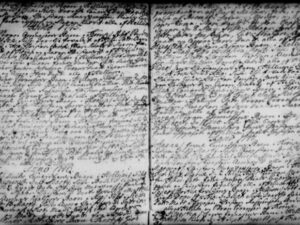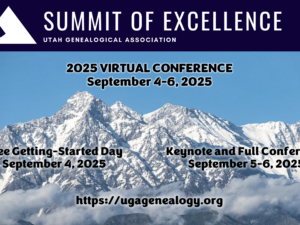Advanced Genealogical Methods
- Description
- Curriculum
Students in Advanced Genealogical Methods will learn how to assemble and use evidence to rediscover ancestral origins, identities, and relationships that have been forgotten over the passage of time. The course will address advanced use of evidence derived from a variety of genealogical sources and will explore research techniques for populations for which the usual records are in short supply. Students will also learn how to document their research and develop written proof summaries to reach accurate conclusions and create a credible record of their findings for present and future generations of family historians.
Day 1, 26 January
Evidence and the Advanced Genealogist, 8:30-9:45
Instructor: Paul Graham, AG, CG, CGG
Advanced genealogists mine sources for information that they turn into evidence used to establish genealogical proof. Learn how to think about the research process conceptually and methodologically.
Research Questions, Hypthoses, and Plans, 10:15-11:45
Instructor: Paul Graham, AG, CG, CGG
Effective research requires thorough planning. Learn how to ask the right questions and write a research plan designed to answer challenging research questions.
Correlating Sources, Information, and Evidence while Resolving Conflicts, 1:00-2:15
Instructor: Paul Graham, AG, CG, CGG
Strong genealogical proof comes from correlation of evidence from numerous sources and resolution of any conflicts between evidence items. Think about methods of presenting information and the ways we categorize types of conflicts.
Victory and Vanquish: An Overview of Manifest Destiny in Federal Land Records, 2:45-4:00
Instructor: Rebecca Whitman Koford, CG, CGL
Day 2, 27 January
Identifying and Citing Sources, 8:30-9:45
Instructor: Paul Graham, AG, CG, CGG
Evidence analysis begins with proper source identification. As advanced genealogists we need to be able to correctly and thoroughly identify unfamiliar sources. That information is then used to make source citations.
Resolving Questions of Identity, 10:15-11:30
Instructor: Nicole Gilkison LaRue, CG, AG
Is John Smith in Source A the same as John Smith in Source B? Who is the subject of these records? “The name is the same” isn’t enough to turn a hypothesis into a conclusion. Explore the evidence used to define identity and the methods for separating conflated individuals.
Bringing the Law to Bear on Complex Genealogical Problems, 1:00-2:15
Instructor: Judy Russell, JD, CG, CGL
The lives of our ancestors were governed by laws, and the records created because of those laws are often the richest sources of information that helps us answer complex genealogical questions. Understanding the law gives us insight not only into the records that were created but often the reasons why our ancestors acted as they did.
Communities and Clusters, 2:45-4:00
Instructor: Paul Graham, AG, CG, CGG
The advanced researcher documents extended family, understands geography, and explores communities. Documenting a person’s relationships and life experience requires bringing together all the source knowledge and analytical skills we can muster.
Day 3, 28 January
Advanced DNA Methods: Genetic Networks and Genetic Coverage, 8:30-9:45
Instructor: Paul Woodbury, MEd, AG
Increasingly, DNA evidence is an important at least as a consideration for achieving genealogical proof. Two advanced methodologies for applying DNA evidence are consideration of genetic networks and application of coverage estimates for targeted testing and multiple subject comparisons. Learn to make the most of current test results, and advance your genetic analysis, improve your DNA organization, and thoroughly consider multiple DNA test subjects.
Government Documents in Federal Records, 10:15-11:30
Instructor: Rebecca Whitman Koford, CG, CGL
Understand the critical value of records found in the US Congressional Serial Set, American State Papers, Statutes at Large, and more. Private Acts and original records at the National Archives contain evidence of genealogical relationships not found elsewhere.
The Genealogical Proof Standard, 1:00-2:15
Instructor: Paul Graham, AG, CG, CGG
Mastering Indirect and Negative Evidence, 2:45-4:00
Instructor: Paul Graham, AG, CG, CGG
Looking beyond direct statements is necessary to answer difficult genealogical questions. Evidence that is suggested (indirect) or based on omission (negative) takes practice to recognize and use for developing a proof argument. Explore various evidence situations and learn to use writing to convey conclusions.
Day 4, 29 January
To and Fro: Advanced Strategies for Tracing Migrations, 8:30-9:45
Instructor: D. Joshua Taylor, MA, MLS, FUGA
Researching the migration of an ancestor and their family is not always straightforward. Records documenting precise movements are often unavailable, requiring genealogists to employ numerous strategies and use multiple sources. Yet, identifying migration patterns is an important research element and is often essential when determining a family’s structure, origins, and other details. This session will demonstrate effective strategies through two case studies tracing families throughout New England, New York, and elsewhere in the 1700s and 1800s. Examples include specific record analysis, evaluating negative evidence, and resolving conflicting information while tracing each family’s migrations.
Overcoming Record Loss to Recover Genealogical Evidence, 10:15-11:30
Instructor: Paul Graham, AG, CG, CGG
It is rare for our ancestors to have only lived in places with complete sets of records. Rather than throwing up their hands in defeat at the first mention of a courthouse fire, the advanced genealogist forges ahead with confidence in their knowledge of sources found in different jurisdictions, institutions, and private hands. Learn thought processes for finding evidence despite loss of the most direct sources.
Advanced DNA Methods: Reasoning is the Glue that Ties Genetic and Documentary Evidence Together, 1:00-2:15
Instructor: Karen Stanbary, LCSW, AM, CG, CGG
Learn best practices and receive guidance for interpreting and writing about genetic evidence. A case study incorporating autosomal DNA (atDNA) and X-chromosome DNA (X-DNA) illustrates the principles.
Writing Genealogy, 2:45-4:00
Instructor: Thomas W. Jones, PhD, CG, CGG, FASG, FUGA, FNGS
This class covers the components, structure, content, and characteristics of clear and effective genealogical writing. It touches on genealogical numbering systems, self editing, and written genealogical products, including family histories, proof arguments, and reports.
Day 5, 30 January
Researching and Identifying Female Ancestors, 8:30-9:45
Instructor: Nicole Gilkison LaRue, CG, AG
Researching female ancestors can be challenging, but it’s not impossible. While genealogical standards provide a basic framework, a discussion of sources and proven methodology provide a deeper understanding of how to identify the women in our families through all available and relevant source material.
US Military Pension and Bounty Land: Research, Analysis, and Law, 10:15-11:30
Instructor: Rebecca Whitman Koford, CG, CGL
From the Revolution to the early 1900s the United States offered federal pensions to its soldiers, and bounty land to veterans who served in conflicts before 1855. The records associated with applying for and obtaining their benefits or lands are some of the most numerous produced by the U.S. government and the most genealogically rich. They touch entire communities, not just the veteran families.
Land, Tax, and Probate: Using Property Ownership to Prove Relationships, 1:00-2:15
Instructor: Paul Graham, AG, CG, CG
Local records related to property ownership are among the most valuable for documenting relationships. Understanding the ways land, tax, and probate records intersect allows us to conduct more thorough research and develop complex proof arguments by telling a more complete story or being able to reconstruct one type of source through information gleaned from another.
Continued Advancement, 2:45-4:00
Instructor: Paul Graham, AG, CG, CGG
Advanced genealogists never stop learning. Discuss the many opportunities available for continuing education.

Classes run 26-30 January, 8:00am-4:30pm Mountain Time.
Course Coordinator: Paul K. Graham, AG, CG, CGG
Faculty:
Rebecca Whitman Koford, CG, CGL
Gena Philibert-Ortega, MA, MAR
D. Joshua Taylor, MA, MLS, FUGA





